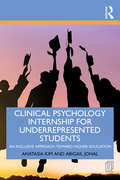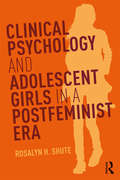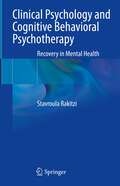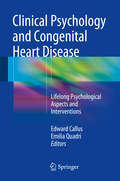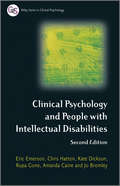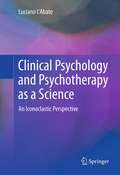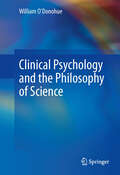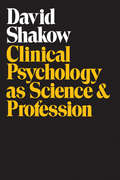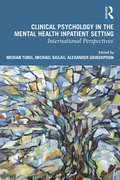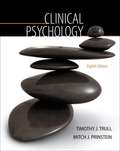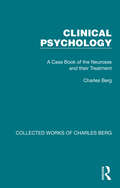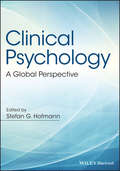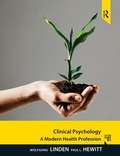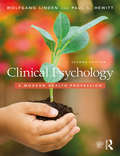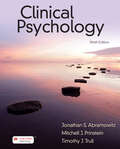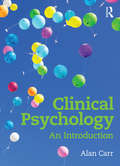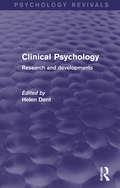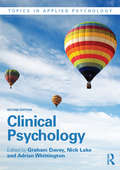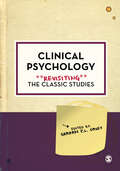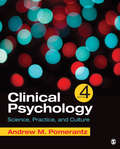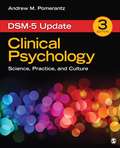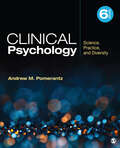- Table View
- List View
Clinical Psychology Internship for Underrepresented Students: An Inclusive Approach to Higher Education
by Anatasia Kim Abigail JohalThis text introduces Taking Flight, a year-long clinical psychology internship program to be implemented for students of color and first-generation college-bound students. The program offers hands-on opportunities for participants to develop skills that will propel them to seek advanced degrees in mental health. The book offers a comprehensive internship curriculum based on a culturally affirming mentorship framework that aims to increase interns’ exposure of clinical psychology, build confidence in their ability, and foster a sense of belonging as a means to inspire educational and career pursuits in the field. Chapters cover topics such as common mental health concerns; self-reflections and insights; research and clinical approaches; capstone projects and presentations; and integration of knowledge, skills, and self-concept. An appendix includes worksheets to utilize throughout the course of the program. The program is designed to be operated within psychology departments in partnership with local high schools. The text will guide mental health providers and school professionals to executing this program in the hopes of ensuring a more diverse and inclusive clinical psychology workforce.
Clinical Psychology and Adolescent Girls in a Postfeminist Era
by Rosalyn H. ShuteAdolescent girls’ wellbeing is under threat. They face pressure to achieve academically while simultaneously negotiating a life dominated by social media, an unrelenting focus on appearance, cyberbullying, sexual harassment and ready access to pornography characterised by male violence to women. The sociocultural environment presents significant risks for girls’ mental health, yet clinical psychology remains largely focused on the individual. Cultural factors are also overshadowed by postfeminist forces and a renewed emphasis on biological determinants of psychological sex differences. Clinical Psychology and Adolescent Girls in a Postfeminist Era goes back to first principles and revisits the question of the place of nature and nurture in children’s development, in the light of what we now know about neural plasticity, dynamic systems and gender socialisation. Feminism and its sometimes uncomfortable relationship with psychology is discussed, as are the meaning and implications of ‘postfeminism’, and whether girls have ‘special strengths’. Practice principles and specific ideas for practice with today’s girls are all included. Finally, there is a complementary chapter on working with adolescent boys. Feminist writings about psychotherapy (with women) had their heyday some time ago, and some see boys as the ones who now need special attention. This book contends that the changing pressures of today’s western world call for a renewed interest in specialised practice with girls, taking account of up-to-date theories about child development, and exploring the idea of expanding clinical practice beyond the individual.
Clinical Psychology and Cognitive Behavioral Psychotherapy: Recovery in Mental Health
by Stavroula RakitziThis book presents the evidence-based treatments in the context of cognitive behavioral therapy and rehabilitation in various disorders in combination with the clinical experience of the author in private practice. Every chapter is structured in the same form. Part A Basics: introduction, definition, the importance, discussion, revision questions, und Part B Disorders: abstract, introduction, clinical features, evidence-based treatments, discussion, revision questions. The book is addressed to psychology students, medicine students, to researchers, to psychotherapists, to psychiatrists and to non-experts. The language of the book is simple enough, so that non-experts can be informed about issues in mental health. The aim of the book is to minimize the stigma towards mental health problems, to give an optimistic message regarding the modern evidence-based treatments in mental health and to clarify that reintegration into society is a realistic goal nowadays.
Clinical Psychology and Congenital Heart Disease: Lifelong Psychological Aspects and Interventions
by Edward Callus Emilia QuadriThis book describes those psychological features specifically characteristic of patients with congenital heart disease, from birth to adulthood. The combination of case studies, descriptions of life experiences and psychological recommendations and collaboration with non-profit organizations in the field ensure that it will serve as an excellent day-to-day learning tool. Technological advances in cardiology and cardiac surgery have resulted in an increase in the number of adults with congenital heart disease, creating a new emergency. From when they are born, these patients and their relatives require extensive support for many reasons, including the uncertainty and restrictions in their lives, frequent hospitalizations and difficulties in the work and social spheres. Clinical Psychology and Congenital Heart Disease explains how psychology can contribute to healthcare treatment of patients with congenital heart disease and their families. Emphasis is placed on the need for a multidisciplinary approach to ensure the well-being of the patient and the clinician is provided with insights and instruments that will assist greatly in the provision of appropriate support.
Clinical Psychology and People with Intellectual Disabilities
by Eric Emerson Chris Hatton Kate Dickson Rupa Gone Jo Bromley Amanda CaineClinical Psychology & People with Intellectual Disabilities provides trainee and qualified clinical psychologists with the most up-to-date information and practical clinical skills for working with people with intellectual disabilities.Represents an invaluable training text for those planning to work with people with intellectual disabilitiesIncludes coverage of key basic concepts, relevant clinical skills, and the most important areas of clinical practiceAll chapters have been fully updated with the latest evidence. New chapters cover working professionally, working with people with autism and addressing aspects of the wider social context within which people with learning disabilities live.Beneficial to related health and social care staff, including psychiatrists, nurses, and social workers
Clinical Psychology and Psychotherapy as a Science: An Iconoclastic Perspective
by Luciano L'AbateThis book demonstrates how clinical psychology and psychotherapy practices may reach a scientific level provided they change the three basic paradigms that have controlled those practices in the last century. These three, now outdated, paradigms, are: (1) one-on-one (2) personal contacts (3) through talk. These paradigms have served well in the past but they are no less helpful in the current digitally focused world.
Clinical Psychology and the Philosophy of Science
by William O'DonohueThe motivation for this volume is simple. For a variety of reasons, clinical psychologists have long shown considerable interest in the philosophy of science. When logical positivism gained currency in the 1930s, psychologists were among the most avid readers of what these philosophers had to say about science. Part of the critique of Skinner's radical behaviorism and thus behavior therapy was that it relied on, and thus was logically dependent on, the truth of logical positivism--a claim decisively refuted both historically and logically by L.D. Smith (1986) in his important Behaviorism and Logical Positivism: A Reassessment of the Alliance.
Clinical Psychology as Science and Profession
by J. Roland PennockOne man alone cannot construct an entire profession, but David Shakow is one of the architects responsible for shaping clinical psychology into the profession it is today. Reflecting the ideas of a man whose name is synonymous with the field, this volume brings together for the first time his most significant papers in this area and presents a comprehensive, far-reaching overview of clinical psychology addressed to all of its professionals and students.Dr. Shakow's forty years of influence as a clinician, training program administrator, professor, researcher, and public servant are profoundly reflected in these papers. They offer insight into the work and world of the clinician, the nature of training programs, the history and development of the profession, and the relationship between clinical psychology and other disciplines. Not simply a descriptive record of one man's achievements, the thinking mirrored in this volume is pertinent, even crucial, to the future development of the field.The author's persistent and continuing concern for top quality in training and practice pervades these essays, making them a unified chronicle of the professional growth of clinical psychology and of a master professional's ideas and involvements with the problems and issues in his field. No clinician or student can fully understand the nature of the field, how it came to be, and where it is going, without reading this volume.
Clinical Psychology for Trainees
by Andrew C. Page Werner G. K. StritzkeThis book describes the practice of clinical psychology with special emphasis on providing trainee therapists with the skills and strategies to achieve the core competencies required for a science-informed clinical practice. It will support the reader in making the transition from the lecture theater to the consulting room. The approach incorporates a contemporary perspective on the multiple roles of clinical psychologists within a competitive healthcare market, where professional psychologists not only need to be accountable for their outcomes and efficient in achieving them, but also need to be conscious of the social and political context in which psychology is practiced. Chapters are organized around the acquisition of key competencies and linked within an evidence-based, science-informed framework. Case studies, handouts, graphics and worksheets are employed to encourage the implementation of the skills described. This book should be read by all those enrolled in, or contemplating, postgraduate studies in clinical psychology.
Clinical Psychology in the Mental Health Inpatient Setting: International Perspectives
by Meidan Turel Michael Siglag Alexander GrinshpoonThis ground-breaking volume provides an encompassing and detailed account of clinical psychologists' highly varied work on the psychiatric ward in mental health inpatient settings. An international collection of clinical psychologists describe challenges and achievements inherent to their work, illustrating application of established, state-of-the-art, and cutting-edge methods and modes of intervention, assessment, therapeutic work, training, and leadership roles currently practiced in these settings. Chapters present numerous examples of psychologists' ability to contribute in multiple ways, benefiting patients, staff, and the overall functioning of the ward. Each of the book’s four sections is dedicated to a specific domain of the clinical psychologist’s work within the psychiatric inpatient setting. These include systemic modes of intervention; psychotherapeutic interventions; assessment and psychodiagnosis; and internship and supervision. From novice to experienced practitioners, psychologists will gain insight from the innovative and creative ideas this book brings to the practice of clinical psychology, as well as the practical suggestions that will enhance the varied interventions and therapeutic work they do in such settings.
Clinical Psychology, 8th Edition (PSY 334 Introduction to Clinical Psychology)
by Timothy J. Trull Mitchell J. PrinsteinIn language your students will understand and enjoy reading, Timothy Trull's CLINICAL PSYCHOLOGY offers a concrete and well-rounded introduction to clinical psychology. A highly respected clinician and researcher, Dr. Trull examines the rigorous research training that clinicians receive, along with the empirically supported assessment methods and interventions that clinical psychologists must understand to be successful in the field. This new edition of Trull's bestselling text covers cutting-edge trends, as well as offers enhanced coverage of culture, gender and diversity, and contemporary issues of health care. Written to inspire students thinking of pursuing careers in the field of clinical psychology, this text is a complete introduction.
Clinical Psychology: A Case Book of the Neuroses and their Treatment (Collected Works of Charles Berg)
by Charles BergOriginally published in 1948 the blurb read: 'Dr Berg has an extraordinary flair for presenting a difficult subject in a most realistic and attractive manner, without sacrifice of scientific essentials. The patients are made to speak for themselves, with the result that we feel actually present at the analytical sessions, sharing the most intimate details of each individual’s life and feelings. Throughout it is alive with real, vivid clinical material. The reader is led through a panorama of troubled minds and disturbed emotions – from the simplest worries and anxieties, through increasing severity of stresses, to incipient major disorders. The whole subject of treatment is reviewed and expounded in compendious detail, concluding with a critical review and revolutionary suggestions for the future. In spite of its novel and entertaining method of exposition, the book covers a surprisingly wide field – the whole field of clinical psychology up to date – and more.' Today it can be read and enjoyed in its historical context. This book is a re-issue originally published in 1948. The language used is a reflection of its era and no offence is meant by the Publishers to any reader by this re-publication.
Clinical Psychology: A Global Perspective
by Stefan G. HofmannThis three-volume guide to CBT is a major new reference work that provides an authoritative and fully up-to-date survey of the various clinical approaches to cognitive behavior therapy. Contributed by leading academics and professionals, the entries are presented in a rational and accessible format. Offers unrivalled coverage of CBT approaches to a full spectrum of mental disorders Contributors include many of the field's leading experts Covers the full range of CBT strategies, including new developments in the field, such as attention retaining strategies, acceptance techniques, mindfulness meditation, and disorder-specific emotion regulation skills Provides practical guidance backed by a wealth of case studies Includes the latest techniques and empirical data 3 Volumes www. cbthandbook. com
Clinical Psychology: A Modern Health Profession
by Paul Hewitt Wolfgang LindenIntroduces students to Clinical Psychology by portraying the field as a health profession that uses cognition, emotion, and somatic principles to help understand, assess, and modify health showcasing the field in its reality. Unique features of the text include: A fresh approach to learning, with an emphasis on problem solving A presentation of clinical psychology as an integrative health care profession and not just a mental health care field Inclusion of social and biological bases of behavior Material pertaining to the realities of being a clinical psychologist
Clinical Psychology: A Modern Health Profession
by Wolfgang Linden Paul L. HewittClinical Psychology invites students to think like clinical psychologists and develop an integrated sense of how science, experience, ethical behavior, and intuition get woven into our professional identity. Built around typical psychologists and the problems they need to solve, it demonstrates that assessment is much more than testing, and explores how treatment rationales are tailored to the individual problems, histories, and environments of clients. Committed to training future professionals, this text navigates students through the career path of a clinical psychologist and provides guidance on evolving education and training models. The text uniquely portrays clinical psychology as a modern health care profession that bridges physical and mental health and takes a holistic stance. It treats therapy as a dynamic process that benefits from the cross-fertilization of a range of different approaches. It also provides an international perspective, describing similarities and differences between how clinical psychology is practiced in different countries and contexts. It recognizes that clinical psychology changes as health care systems change, and stresses that training models and practice patterns need to match these changes. This second edition has been fully revised and reflects DSM-5 and ICD-10-CM guidelines. New and enhanced features include: Additional description of the continuing integration of therapy approaches Additional evidence on how to make psychotherapy cost-effective Upgrades on self-help and web-based treatment An expanded chapter on psychopharmacology, offering more information on mechanisms Expanded in-text pedagogy, offering more vignettes, ongoing considerations, key terms, and thinking questions Powerpoint slides and links to recommended resources.
Clinical Psychology: A Scientific, Multicultural, and Life-Span Perspective
by Jonathan S. Abramowitz Mitchell Prinstein Timothy TrullThe ideal brief introduction to the science and practice of clinical psychology in today’s world.
Clinical Psychology: An Introduction
by Alan CarrClinical Psychology is for students studying clinical psychology as part of an undergraduate programme in psychology, nursing, sociology or social and behavioural sciences. Undergraduate students who wish to know if postgraduate study in clinical psychology would be of interest to them will find this book particularly useful. The book will inform students about: the profession of clinical psychology how to get onto a clinical psychology postgraduate training programme the way clinical psychologists work with children, adolescents and adults with common psychological problems the main models of practice used by clinical psychologists, and the scientific evidence for the effectiveness of psychological interventions. There is a focus on both clinical case studies and relevant research, and the book includes summaries, revision questions, advice on further reading and a glossaryof key terms, all of which make it an excellent student-friendly introduction to an exceptionally interesting subject.
Clinical Psychology: Research and Developments (Psychology Revivals)
by Helen DentOriginally published in 1987, this book presents papers from the First Conference of European Clinical Psychologists, held at the University of Kent Canterbury in July of that year. It shows some of the most exciting and recent developments in research and innovations in professional practice from many European countries with an overall theme of the WHO strategy of ‘Health for all by the year 2000.’ The whole range of clinical psychology is covered, including: cognitive therapy, clinical psychology and WHO strategy, the mental health of ethnic minority groups, health psychology, care in the community, and many other topics. The book is likely to be of interest for anyone concerned with the recent history and policies in clinical psychology.
Clinical Psychology: Research, Assessment And Treatment In Clinical Psychology (Topics in Applied Psychology)
by Nick Lake Adrian Whittington Graham DaveyClinical Psychology, Second Edition offers a comprehensive and an up-to-date introduction to the field. Written by clinical practitioners and researchers, as well as service users who add their personal stories, the book provides a broad and balanced view of contemporary clinical psychology. This new edition has been extensively revised throughout and includes a new section on working with people with disabilities and physical health problems. It also includes a new chapter on career choices, and help and advice on how to move forward into clinical psychology training. The book starts by explaining the core elements of what a clinical psychologist does and the principles of clinical practice, as well as outlining the role of the clinical psychologist within a healthcare team. It goes on to cover issues involved with working with children and families, adult mental health problems, working with people with disabilities and physical health problems, and the use of neuropsychology. The final part of the book explores current professional issues in clinical psychology, the history and future of clinical psychology, and career options. The integrated and interactive approach, combined with the comprehensive coverage, make this book the ideal companion for undergraduate courses in clinical psychology, and anyone interested in a career in this field. It will also be of interest to anyone who wants to learn more about the work of a clinical psychologist, including other healthcare professionals.
Clinical Psychology: Revisiting The Classic Studies (Psychology: Revisiting the Classic Studies)
by Graham C.L. DaveyClinical Psychology: Revisiting the Classic Studies traces 14 ground-breaking studies by researchers such as Leo Kanner, David T. Lykken and Aaron T. Beck to re-examine and reflect on their findings and engage in a lively discussion of the subsequent work that they have inspired. Revisiting the Classic Studies is a series of texts that introduces readers to the studies in psychology that changed the way we think about core topics in the discipline today. It provokes students to ask more interesting and challenging questions about the field by encouraging a deeper level of engagement, both with the details of the studies themselves and with the nature of their contribution. Written by researchers at the cutting edge of these developments, the chapters in each text provide details of the original works, as well as their theoretical and empirical impact.
Clinical Psychology: Revisiting The Classic Studies (Psychology: Revisiting the Classic Studies)
by Graham C.L. DaveyClinical Psychology: Revisiting the Classic Studies traces 14 ground-breaking studies by researchers such as Leo Kanner, David T. Lykken and Aaron T. Beck to re-examine and reflect on their findings and engage in a lively discussion of the subsequent work that they have inspired. Revisiting the Classic Studies is a series of texts that introduces readers to the studies in psychology that changed the way we think about core topics in the discipline today. It provokes students to ask more interesting and challenging questions about the field by encouraging a deeper level of engagement, both with the details of the studies themselves and with the nature of their contribution. Written by researchers at the cutting edge of these developments, the chapters in each text provide details of the original works, as well as their theoretical and empirical impact.
Clinical Psychology: Science, Practice, and Culture
by Dr Andrew M. PomerantzRecipient of the 2017 Textbook Excellence Award from the Textbook & Academic Authors Association (TAA) Up to date with current DSM-5 coverage throughout, the comprehensive, highly-readable Fourth Edition of Clinical Psychology: Science, Practice, and Culture provides students vital exposure to the real-world practice of clinical psychology balanced with the latest research in the field. Throughout the book, author Andrew M. Pomerantz explores clinical assessment, psychotherapy, ethical and professional issues, current controversies, and specialized topics in a scholarly, yet fascinating, easy-to-read style. Value-priced and packed with clinical examples, the Fourth Edition offers more coverage of cultural/diversity issues in clinical psychology than any other text for the course, as well as thorough coverage of recent, prominent developments in psychotherapy and clinical assessment. New topics, new pedagogy, expanded discussions of ethics, and hundreds of new references published since 2014 make this a resource students will keep and refer to throughout their professional lives.
Clinical Psychology: Science, Practice, and Culture
by Dr Andrew M. PomerantzRecipient of the 2017 Textbook Excellence Award from the Textbook & Academic Authors Association (TAA) Up to date with current DSM-5 coverage throughout, the comprehensive, highly-readable Fourth Edition of Clinical Psychology: Science, Practice, and Culture provides students vital exposure to the real-world practice of clinical psychology balanced with the latest research in the field. Throughout the book, author Andrew M. Pomerantz explores clinical assessment, psychotherapy, ethical and professional issues, current controversies, and specialized topics in a scholarly, yet fascinating, easy-to-read style. Value-priced and packed with clinical examples, the Fourth Edition offers more coverage of cultural/diversity issues in clinical psychology than any other text for the course, as well as thorough coverage of recent, prominent developments in psychotherapy and clinical assessment. New topics, new pedagogy, expanded discussions of ethics, and hundreds of new references published since 2014 make this a resource students will keep and refer to throughout their professional lives.
Clinical Psychology: Science, Practice, and Culture (Third Edition)
by Andrew M. PomerantzThe book intends to provide a balanced approach to clinical psychology in a professional yet accessible style and includes up-to-date information on all topics.
Clinical Psychology: Science, Practice, and Diversity
by Andrew M. PomerantzFrom award-winning author Andrew M. Pomerantz comes the Sixth Edition of Clinical Psychology: Science, Practice, and Diversity, providing students with an inclusive and culturally competent view of the vast world of clinical psychology. Through lively examples, robust scholarship, and a highly readable narrative, the author explores the key topics of clinical assessment, psychotherapy, and ethical and professional issues while also incorporating discussions of current controversies and specialized topics. With a career-focused feature and the latest research findings in the field, the new edition of this best-selling text is an essential resource for students in the classroom and beyond. This title is accompanied by a complete teaching and learning package. Contact your SAGE representative to request a demo. Learning Platform / Courseware SAGE Vantage is an intuitive learning platform that integrates quality SAGE textbook content with assignable multimedia activities and auto-graded assessments to drive student engagement and ensure accountability. Unparalleled in its ease of use and built for dynamic teaching and learning, Vantage offers customizable LMS integration and best-in-class support. It’s a learning platform you, and your students, will actually love. Learn more. Assignable Video with Assessment Assignable video (available in SAGE Vantage) is tied to learning objectives and curated exclusively for this text to bring concepts to life. Watch a sample video now. LMS Cartridge: Import this title’s instructor resources into your school’s learning management system (LMS) and save time. Don’t use an LMS? You can still access all of the same online resources for this title via the password-protected Instructor Resource Site. Learn more.
